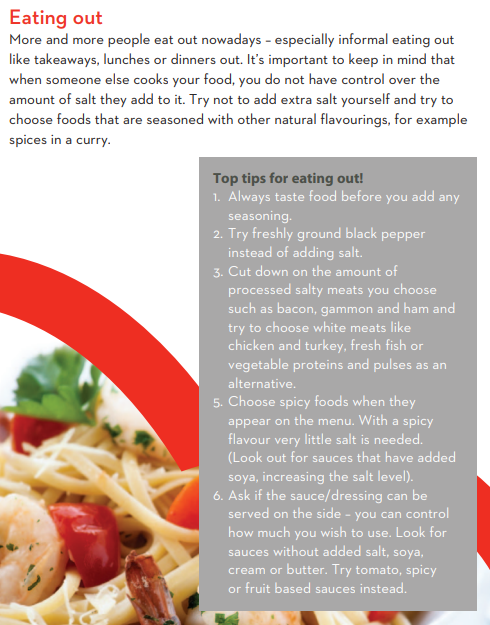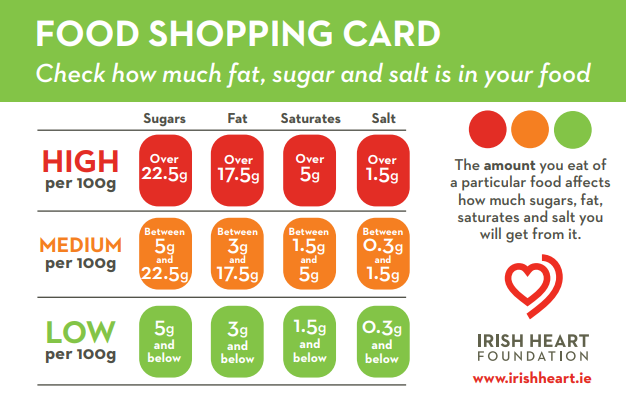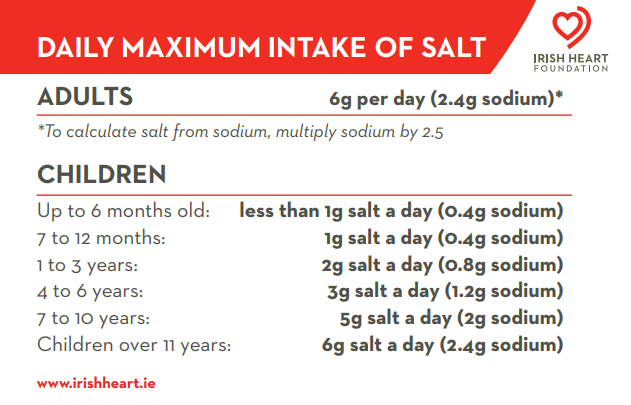Skip the Salt, Add Some Spice
Research shows that too much salt in our diets can increase our blood pressure levels and therefore increase our risk of a heart attack or stroke. Consuming too much salt causes the body to retain water, resulting in swelling, especially in the hands and feet.
According to the Irish Heart Foundation, the maximum daily recommended amount of salt for an adult is 6 grams or one teaspoon. The vast majority of the salt we get every day is already present in the food we eat. Many people exceed this level of salt intake and eat on average about 9-10 grams of salt per day. About 70% of the salt we eat comes from processed foods, fast food, canteen and restaurant food. About 20% is added at home in cooking or at the table. And only 15% occurs naturally in food. Some of the foods we eat regularly, for example soups, some cereals, bacon and sausages, have the same levels of sodium as seawater! One cup of soup has the same amount of salt as two cups of seawater, and one bowl of some cereals contains the same amount of salt as one cup of seawater.

We can reduce our salt consumption by using a variety of alternative flavourings or seasonings. We can retrain our palate to be more sensitive to other flavours, helping us to enjoy a wider range of food.
- Fresh herbs: fresh, soft herbs, especially parsley, mint, basil and coriander, add sensational bursts of flavour when added to dishes. Add them at the end of cooking so they don’t lose any of their bright, fresh flavour.
- Dried spices and dried herbs: re-invigorate the spice rack to add amazing flavour. ‘Warm’ spices such as cumin, coriander and smoked paprika add an interesting and delicious savoury flavour to sauces, stews and curries. Sage and tarragon can be used to season meat. Spices taste best when they are cooked, so add them at the beginning or during cooking.
- Stock up on stock: to add another touch of savoury flavour, we can cook with reduced-salt versions of stock. A 50:50 blend of reduced-salt chicken stock and water is good in risotto, pilaf-style rice dishes and vegetable-based soups. If using powdered stock, add more water than specified in the instructions.
- Add heat: if we’re partial to hot food, chillies and ginger could be a great help. Use liberally in stir-fries, braises & soups.
- Use alliums: all members of the onion and garlic family (allium family) are great flavour boosters. Chives and spring onions can be added at the end of cooking for fresh flavour, and onions and garlic cooked slowly at the beginning of a dish will add depth and savour. Garlic bulbs, roasted slowly in tinfoil, can be used whole over roasts and grilled meats.
- Zest it up: citrus zest and juice create bursts of flavour on the palate and stimulate taste buds. Why not invest in a citrus zester and use it to take off the outer peel of lemons and limes. Add zest to savoury dishes: in salads, on vegetable side dishes, in dressings and sauces, in chillies and dips. A dash of lemon or lime juice added at the end of pan-frying fish or chicken adds a zingy flavour.
The table below shows some clever ways to skip the salt and add some exciting new herbs and spices to food.
.png?sfvrsn=3455f3f0_1)
The Irish Heart Foundation’s website has more great tips to help cut down on salt, and to reduce the risk of heart disease and stroke. Below is a guide to everyday swaps we can easily make day-to-day, tips for salt reduction when eating out and a handy food shopping card to help determine which items have a healthy amount of salt.


Irish Heart Foundation Cut Down on Salt Publication can be found here.


Irish Heart Foundation Food Shopping Card can be found here.







.jpg?sfvrsn=bc97231b_1)




.jpg?sfvrsn=5a81ae69_1)
